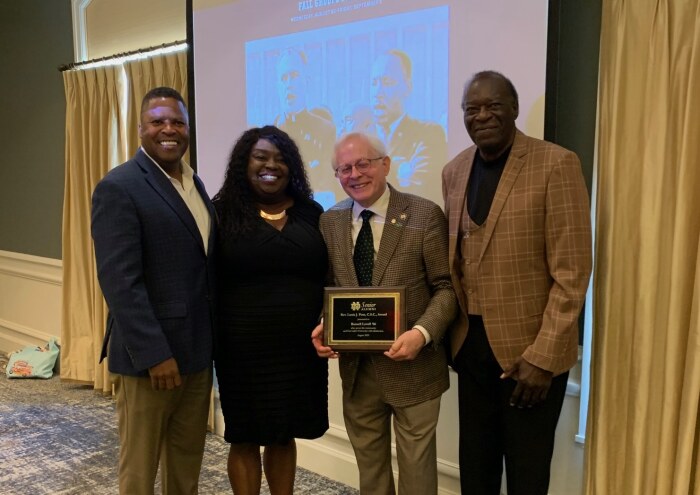Russell Lovell was troubled by the segregation and discrimination he witnessed growing up in a small Nebraska town and resolved to work on civil rights while attending law school in his home state during the late 1960s. His passion for justice extended beyond his nearly 40-year career as a Drake Law School professor and recently earned Lovell an award from the Notre Dame Alumni Association “for his outstanding dedication to advancing civil rights and his commitment to providing experiential learning to the next generation of lawyers.”
Iowa-Nebraska NAACP President Betty Andrews nominated Lovell for the Rev. Louis J. Putz, C.S.C., Award, citing his “fifty years of exceptional NAACP pro bono civil rights advocacy.” As co-chairs of the Iowa-Nebraska NAACP and Des Moines Branch NAACP Legal Redress Committees, Lovell and fellow Drake Law Professor Emeritus David Walker have collaborated on eight amicus briefs submitted to the Iowa Supreme Court. They have also successfully pushed for systemic reforms to make Iowa juries more diverse.
The Iowa Chapter of the National Bar Association recognized Lovell’s civil rights work and advocacy for representative juries in 2020.
In a news release announcing Lovell’s award from Notre Dame, Andrews described the honoree as “a true champion for social justice and civil rights as well as a sagacious legal advisor.” She noted that he “tirelessly volunteers ‘full-time’ on NAACP advocacy and has done so since his retirement from Drake Law in 2014.”
As a student at the Nebraska College of Law, Lovell heard a speech by then U.S. Supreme Court Justice Abe Fortas, which focused on the landmark Gideon v. Wainwright case from 1963. As a pro bono attorney for Clarence Gideon, Fortas won a unanimous U.S. Supreme Court decision: the Sixth Amendment requires states to provide legal counsel if a defendant who cannot afford to hire a lawyer is charged with a crime that could lead to imprisonment. Lovell later recalled that he was inspired by Justice Fortas’ advice to the students: “As a lawyer you will make a good living and enjoy prestige. But you can do much more. You have a special skill set, and I challenge you to use it in the fight for justice and equality.”
After graduating from law school, Lovell clerked for a judge on the Eighth Circuit U.S. Court of Appeals. His research guided the appeals court in a 1970 case known as Lela Mae Haney v. County Bd., of Educ of Sevier County. In Haney, the appeals court recognized the broad scope of the affirmative duty of federal district courts “’to render a decree which will so far as possible eliminate the discriminatory effects of the past as well as bar like discrimination in the future.'” For that reason, the court overturned a District Court order, which had allowed an Arkansas school board not to assign the teachers at the former “Black” school to teaching positions in the new integrated system.
The Notre Dame Alumni Association cited Lovell’s “key role” in a 1972 case known as Morrissey v Brewer. The U.S. Supreme Court determined in that case that parolees have the right to a hearing before their parole is revoked.
Following his clerkship, Lovell did legal advocacy work in Indianapolis. He served as NAACP lead counsel in Bailey v. DeBard, a pattern and practice class action civil rights suit. He later was lead counsel for a similar case the NAACP brought in Iowa, known as Moore v. City of Des Moines. Those lawsuits led to federal court consent decrees that integrated the Indiana State Police Department in the 1970s and the Des Moines Fire Department in the 1980s and 1990s.
The Iowa-Nebraska NAACP’s news release also cited Lovell’s work as lead counsel on Missouri v Jenkins, a long-running Kansas City School desegregation case from the 1980s.
Administrative reform has been another focus of Lovell’s work on behalf of the NAACP. The organization persuaded then Governor Terry Branstad to create a criminal justice working group in 2015, which recommended systemic changes to jury selection. Lovell and Walker have co-authored amicus briefs for the NAACP that led to important Iowa Supreme Court rulings on jury pools and jury selection. They have pushed for changes to the Iowa Rules of Criminal Procedure to address disparities.
In a recent email to Bleeding Heartland, Lovell, Walker, and Andrews described other work with Iowa’s Office of State Court Administration. In response to concerns the NAACP had raised, that office “developed a statewide Jury Management Policy, revised the jury questionnaire, and reformed and systemized its processes for gathering and organizing data on the composition of jury pools, jury panels, and trial juries.”
While the Iowa-Nebraska NAACP has not won every battle in this area, the Iowa Supreme Court did amend its rules in 2021 to make Iowans with criminal convictions eligible for jury service if their voting rights have been restored. That change improves the prospect of a jury pool that reflects the racial diversity of a county’s population, because under an executive order Governor Kim Reynolds issued in 2020, Iowa now has an automatic process for restoring voting rights to most people who have completed felony sentences.
Lovell and Walker are in the process of analyzing updated data on the racial composition of Iowa juries. They plan to present their findings at the 11th Annual Iowa Summit on Justice and Disparities on November 3.
Top photo, from left: Iowa Bar Association President Emeritus Henry Hamilton, Iowa-Nebraska NAACP President Betty Andrews, Russell Lovell, and retired Drake University leader Dolph Pulliam. Photo provided by the Iowa-Nebraska NAACP and published with permission.

